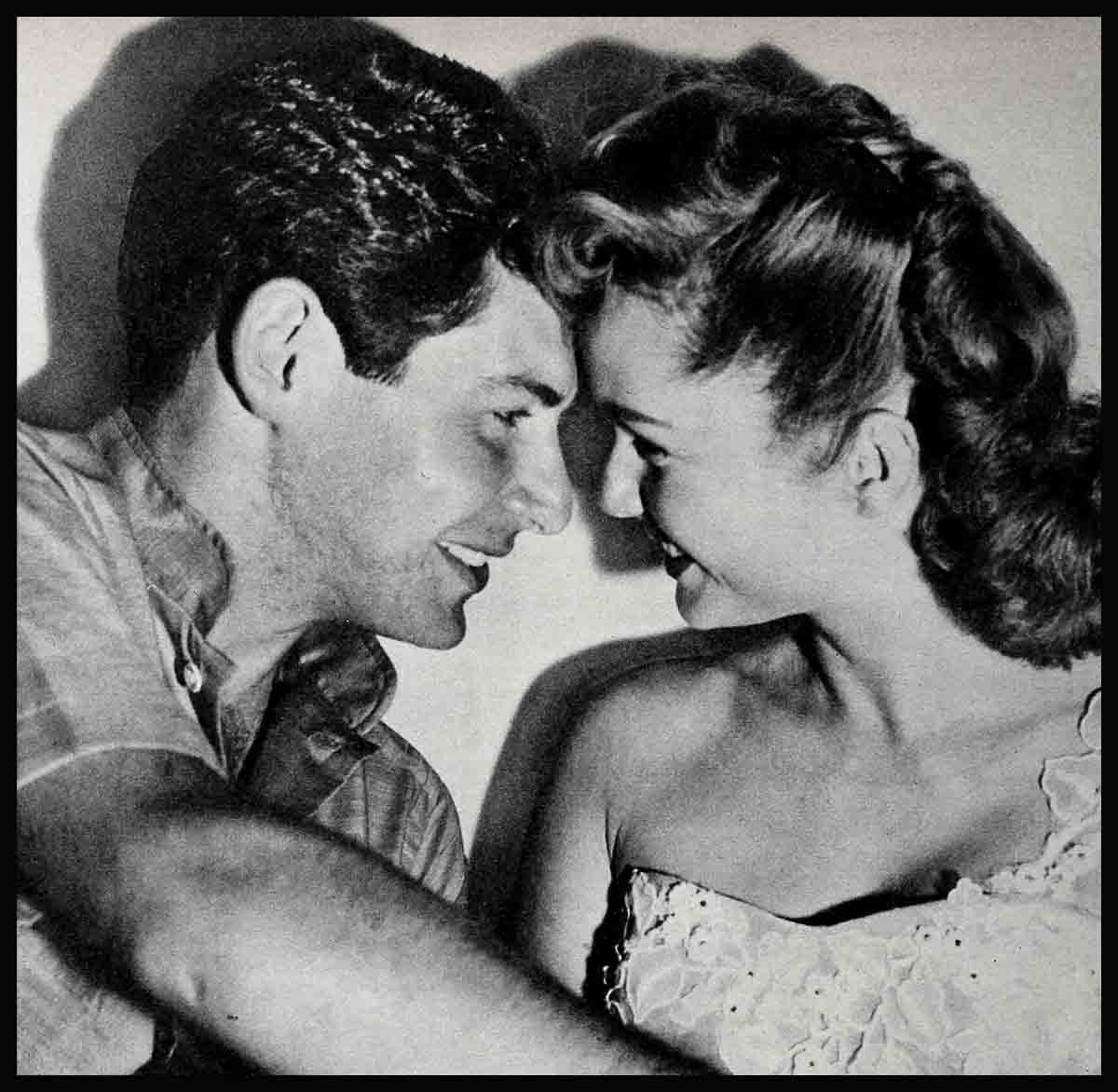
A Wonderful Thing Happened Today—Debbie Reynolds & Eddie Fisher
Debbie Reynolds heard the shrill ring of the old alarm clock on the small night table next to her bed. She opened one eye slightly, reached over and pushed down the alarm stop, then turned over in her bed, promising herself, “Only one more minute, old girl, then you gotta get up.”
Which is just about the way every morning began for Debbie, until Mom came up and vocally shoved her out of bed. And as far as she knew, today was going to be like any other day. After breakfast, she’d drive her salmon and cream Pontiac to the studio, take a dancing lesson until noon, eat a light lunch and work all afternoon on a routine for “Athena.” Supper would be shared as usual with Mom and Pop, and since she had the evening free, maybe Mom would hem her red ballerina skirt. All in all, a nice pleasant day, but nothing out of the ordinary. . . .
What Debbie didn’t know, or she might have flown out of bed that lovely May morning, was that today was to be a very special day—perhaps the most important day in her whole life. For today she was destined to make a date with love. That sunny morning as she drove to the studio, she had not even an inkling of his name. Six weeks later, a love-starved world was to thrill over her new-found happiness and her love story was to be called “the sweetest young romance of the year.”
It might be said that Debbie’s and Eddie’s romance began three years ago at the Walter Reed Army Hospital in Washington, D. C., where they both did a show and where they first met. It might also be said that their romance was slow in getting started, for except for a letter from Eddie when he was in Korea, it took them three years to get together again—as Debbie explains, “He just didn’t ask me.”
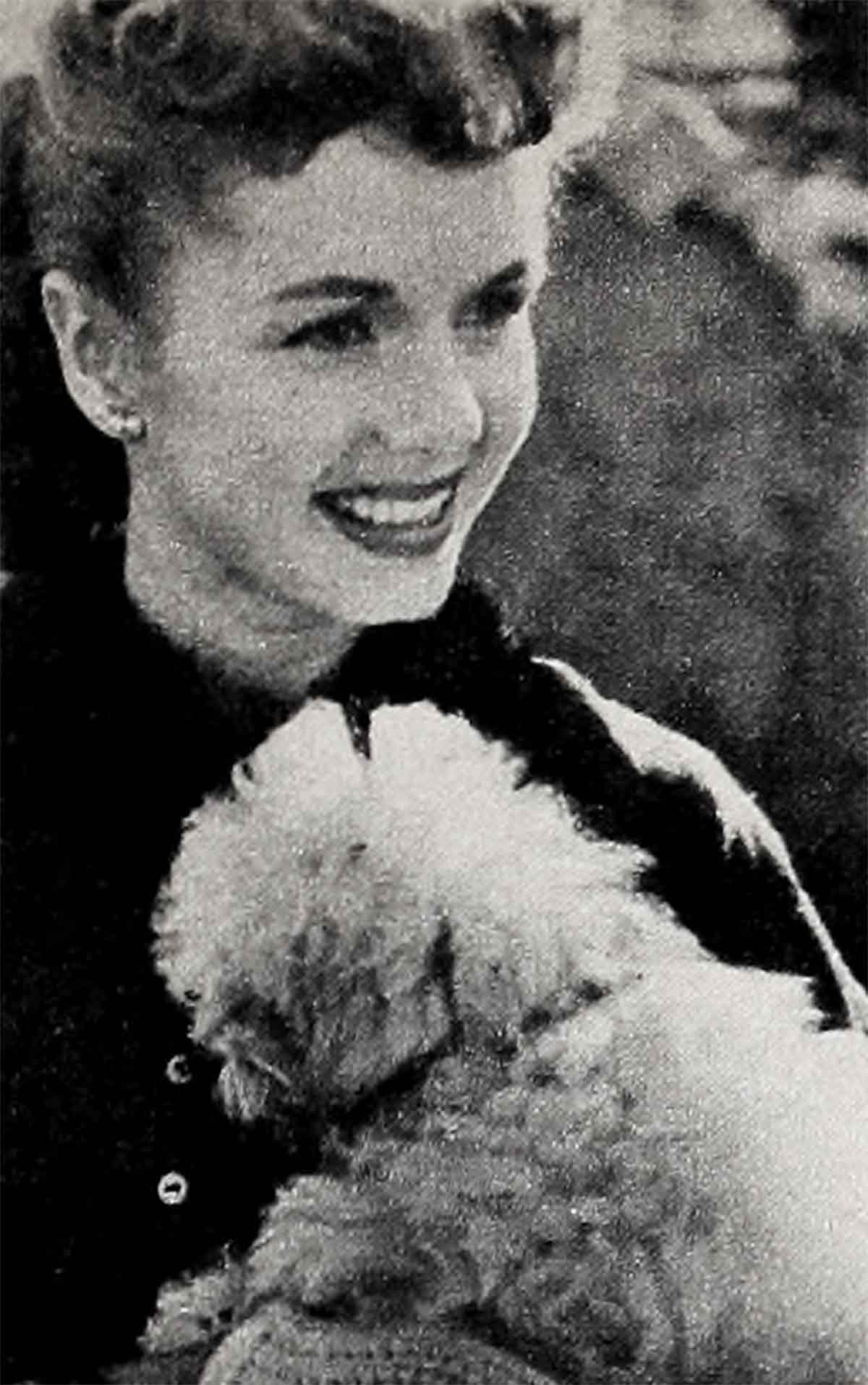
When they met for the second time last spring while Eddie was touring the M-G-M studio with Joe Pasternak, it was obvious that they were “in key” this time and Eddie seriously impressed, for he asked her for her phone number. Debbie must have been equally impressed, for despite an already full little black book, she says, “I gave the telephone number to him.” She didn’t have to wait long for a call. Eddie telephoned her the next day and continued to call regularly. Long talks and gentle kidding on the phone, though, were all that happened between the two for some time. They didn’t date, for as Debbie now incredulously admits, “I didn’t know anything about him.”
And then one evening in June, while Debbie was finishing dinner, she received a long-distance call from New York. It was Eddie. Could she save him an evening—the seventeenth of June? She could, she replied. And this is where their story begins. . . .
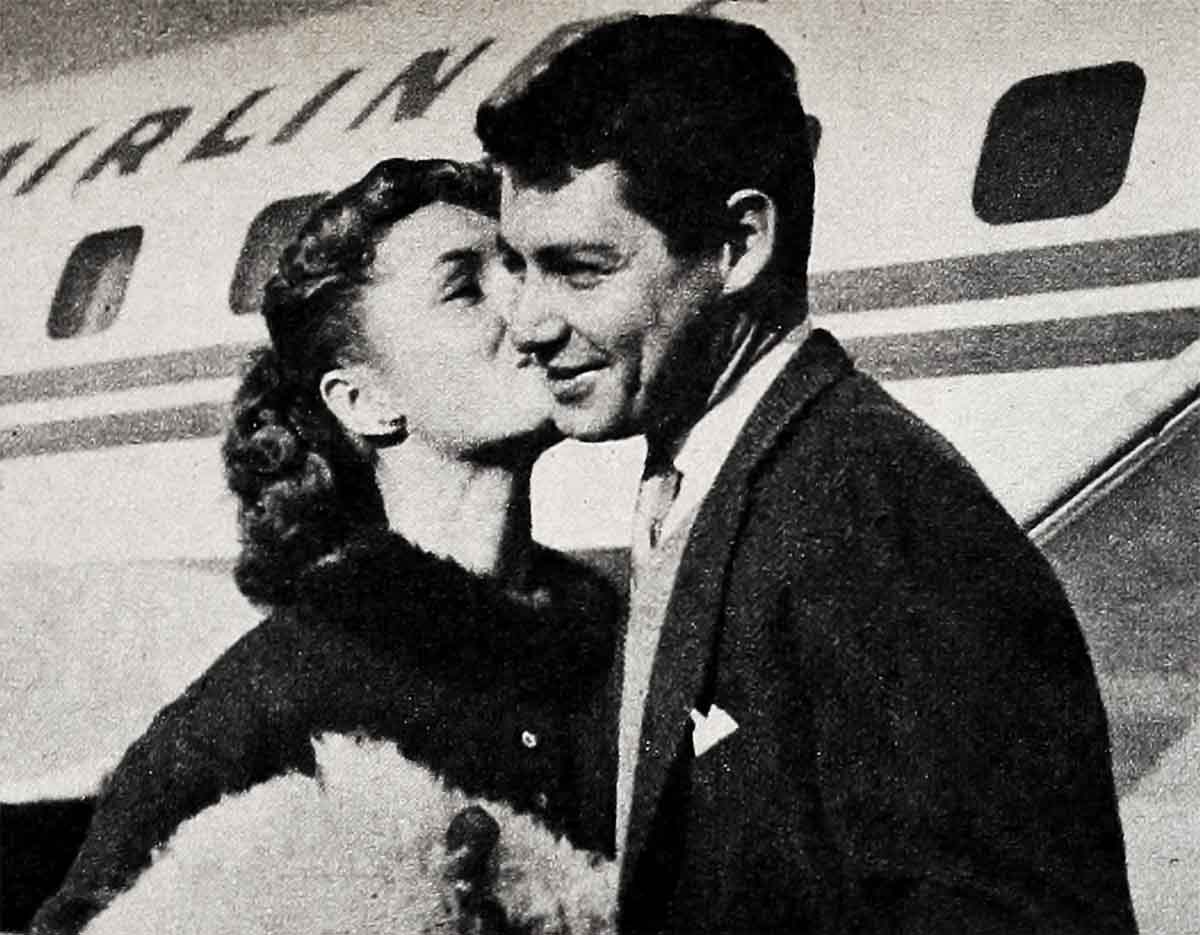
For unknown at the time to the pixyish ball of fire, this was not only the opening night of Eddie’s Cocoanut Grove show but she was his date. And this was also to be the opening night of their romance. “When I marked the date on my calendar, I hadn’t realized what the seventeenth was. Then one morning I was reading in Variety all about Eddie Fisher’s big opening at the Cocoanut Grove on June seventeenth. I nearly died. I said to Mother, ‘I’ve nothing to wear. I’ve got to have a special gown.’ On opening night, dressed in a lovely red formal that her mother had made, Debbie sat at Eddie’s table along with her parents, his dad and his best friends. Who knows exactly when during that evening, as she sat listening to Eddie sing to the biggest opening-night audience the Grove has ever had, love stepped in?
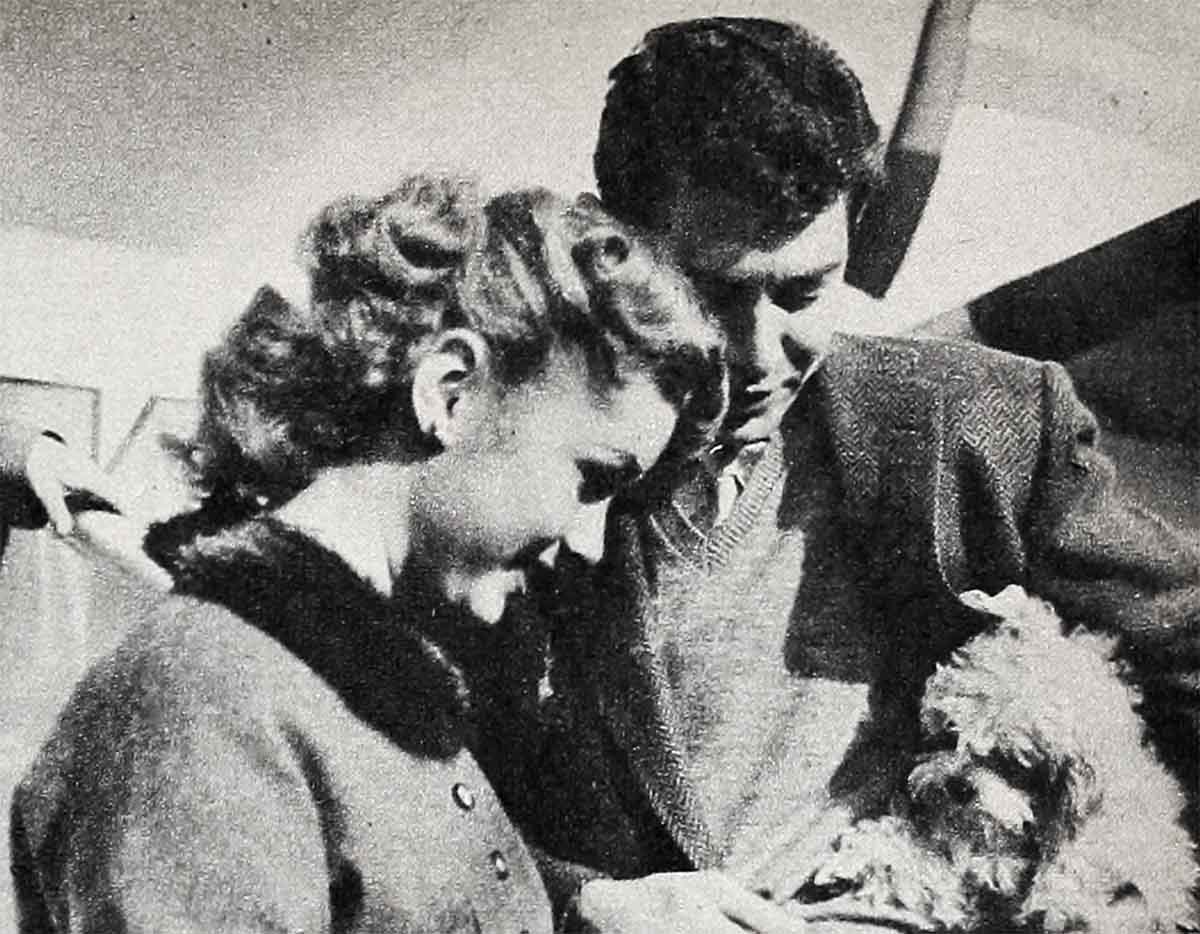
Perhaps it was when Eddie sang his favorite song to his dad, “Oh! Mein Pa-Pa” and Debbie sensed the deep loyalty and sincerity Eddie has for those he loves.
Perhaps for Eddie it was when Debbie, starry-eyed and aglow, pushed forward to congratulate him, full of enthusiasm and pride, so willing and eager to make his night a complete success, to share with him the excitement of the evening. Whenever love entered, neither Debbie nor Eddie know. But they will admit that it sneaked in that evening. “We just kept grinning at each other like two idiots. And the first thing you know,” says Debbie, “we were seeing a lot of each other. And you know how that is. You sort of get the habit of being together and then all of a sudden you know that you like the habit real well.”

The “habit” included seeing Eddie every single day, forty-two times, for the entire six weeks he stayed in Hollywood. It included a chaperoned weekend at Las Vegas, luncheon at the Brown Derby, intimate little dinner parties and big parties like Debbie’s “Susan Slept Here” preem. For Debbie it meant stopping at Eddie’s Benedict Canyon house on the way home from work for a quick chat, dancing with Eddie singing “I Need You Now” softly into her ear, holding hands in the movies and sharing a Coke after his Hollywood Bowl concert. It meant exchanging presents. For his birthday, Debbie gave Eddie gold cuff links inscribed: “A wonderful thing happened today—You.” It wasn’t Debbie’s birthday, but Eddie sent her a Coke machine equipped with his favorite soft drink.

By the time Eddie left Hollywood for his European engagement, the little girl who didn’t want to fall in love (she never tried catching the bride’s bouquet because “I thought it might be bad luck”) was already caught in love’s clutches.
From shipboard, Eddie called every day; from Europe he called as often as he could get through to her, and back in Hollywood, Debbie’s friends realized how serious it was when she discontinued her long date line and attended only necessary Hollywood functions with Eddie’s friend Joey Forman.
It was during this trip, too, that Milton Blackstone, Eddie’s manager and closest friend, said, “I think Eddie finally realized his feelings during this trip. He discovered in Rome that he missed Debbie very much and telephoned her as constantly as he could get a call through. Not that there seemed to be any doubt about his feeling before. I’m sure, it just crystallized when he realized how far away he was from someone he was so fond of.”

By this time there wasn’t a single Reynolds or Fisher fan who wasn’t waiting with bated breath to hear what was going to happen next. An extension phone was installed in the Reynolds’ Burbank home to handle columnists’ demands for information, and Mrs. Reynolds had to lay down the law, “Mary Frances, there will be no telephone calls, made or answered, during dinner hour.”
When Eddie returned home from his two-week engagement in London (with a quart of Arpege perfume and a “good conduct medal” for Debbie), he deftly evaded a direct answer to questions: “How serious is it? Are you engaged?” “I’ve only known Debbie for six weeks,” he said. “And that’s not long enough to talk about marriage—a sensible lasting marriage.” But his enthusiasm couldn’t be completely controlled and a wise world smiled knowingly as he blurted out. “Debbie has everything, and she hasn’t changed. She’s kept her two feet right on the ground. She has so much talent. She’s so intelligent. She’s honest. She’s sincere. She’s fun. She’s just a wonderful—wonderful girl . . . As for marriage, I don’t know if Debbie loves me that much. . . .”
Debbie, shyer, merely said, “Yes, I am going ‘steady’ with Eddie, but there’s no engagement.”
Mrs. Reynolds would only add: “It may happen some time in the future—but it isn’t true now.”
Milton Blackstone was more direct: “I’m certain they have talked about marriage. The romance is very, very serious.”
And a new romance was born and tickered across the nation.
Anybody who saw the radiant pictures of the five-foot-one-and-a-half-inch Texas bombshell when she stepped off the plane with her mother and greeted Eddie at Idlewild Airport knew that what these two youngsters felt for one another was important and serious.
And in every way, since they first began dating, Eddie and Debbie have handled their relationship with dignity and good taste—not an easy thing to do with millions of eyes eagerly watching them.
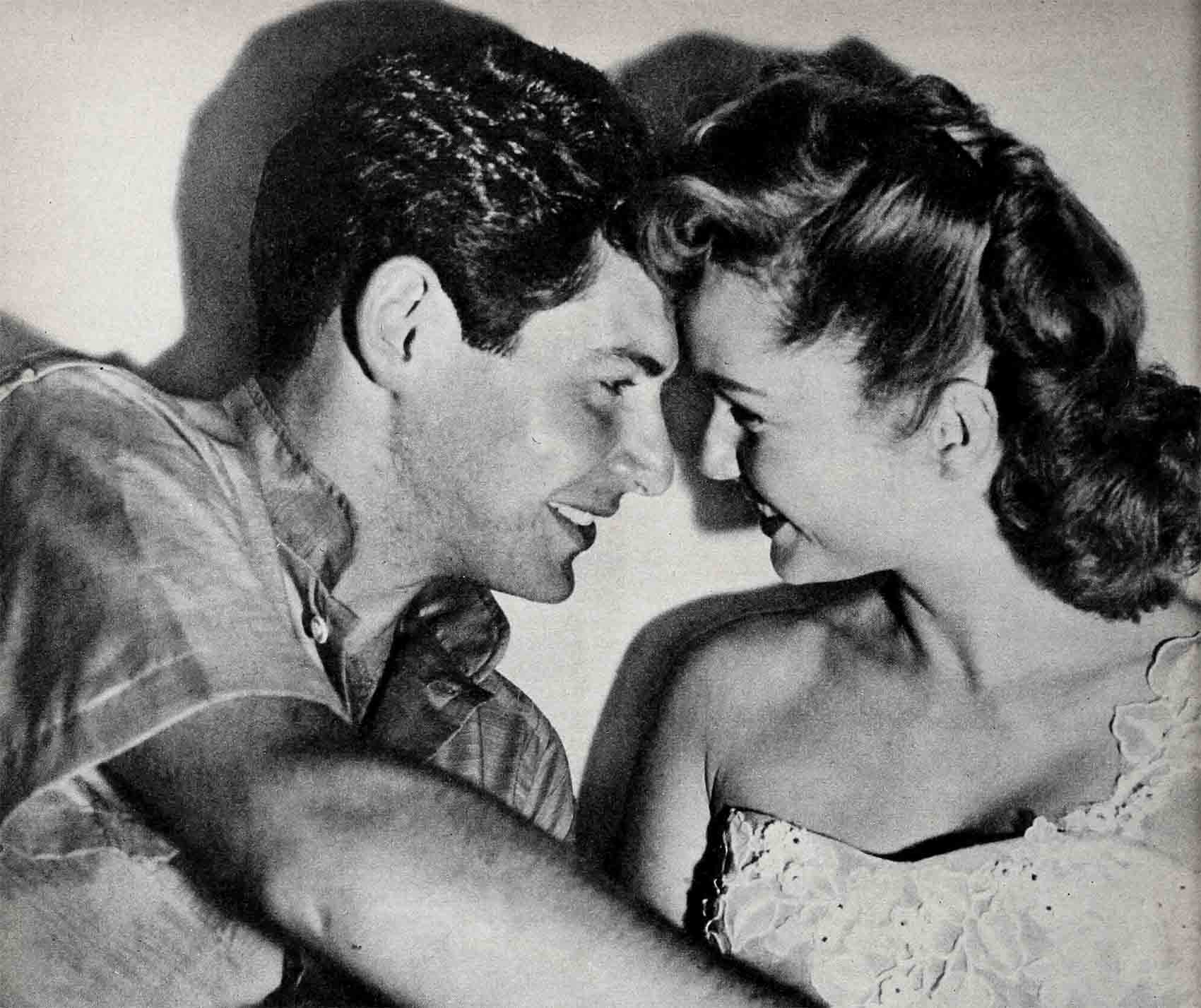
But to anyone who knows Debbie and Eddie this is no surprise. Behind those long-lashed saucer-blue eyes and perpetual bounce, there’s a very mature Miss Reynolds, who’s seriously concerned with her career and her future. Since she was found in a tattered old bathing suit behind the title of “Miss Burbank” seven years ago, Debbie has worked extremely hard at her career and at “being decent, honest and aboveboard.” In Hollywood, as in other communities, this isn’t always easy. But at twenty-two, little Miss Reynolds finally has those dancing feet planted firmly on the ground. She knows where she is going and, what’s more important, knows what she wants out of life. Part of those dreams include a marriage that’s as solid as her mother’s and dad’s. Being wise, both Eddie and Debbie realize that such a love can only be built upon a firm foundation. They hope that they are building that foundation together now. This is the reason why Debbie was insistent that her mother come east with her to meet Mrs. Kate Fisher, Eddie’s mother. She felt both families should like one another, too. And while the young ones saw the town together, Mrs. Reynolds and Mrs. Fisher got acquainted.
The results were great. Both mothers got along famously well. In fact, all four seemed so completely delighted with the situation that it’s a tossup which family was prouder when Mr. and Mrs. Reynolds announced the engagement on October 19. This seems to be one storybook romance with no serious complications.
For one thing, both Eddie and Debbie come from the same background and share about the same interests. Born Mary Frances Reynolds (which is what Eddie calls her in private) on April Fool’s Day, 1932, in Texas, Debbie moved to California at seven when her dad, a carpenter for the Southern Pacific Railroad, was transferred. It was during the depression and money was scarce. She never seriously thought of the movies then, except as a nice place to go to Saturday afternoon, until her imitation of Betty Hutton at the local movie house won her the title of “Miss Burbank of 1948” and caught the watchful eye of a Warners talent scout.
Without much warning, at 16 Debbie suddenly found herself in the movies. She admits now that she wasn’t convinced she was meant for them, and it took her a few years in the “business” before she willingly traded her gym-teacher dreams for those of a movie beauty. In “Susan Slept Here,” Debbie “clicked” and there should be no stopping her climb now. She has refreshing cuteness, spontaneity, a talent for singing, dancing and mimicry and has been called “a born comedienne.” Debbie hasn’t changed much, not even “gone Hollywood” a little. She continues to live with her family in the same modest house they bought when they first arrived from Texas. A large wardrobe (“Father had to enlarge the closet space in my room twice”) and a swimming pool in the backyard are the only evidence of fame. Mrs. Reynolds still makes Debbie’s clothes.
Eddie had to make his own way, too. He was born Edwin Jack Fisher (Debbie likes to call him Edwin Jack) in Philadelphia’s south side on August 10, 1928, one of seven children of Kate and Joe Fisher. He can remember vividly how his dad struggled to keep them all fed and, out of desperation, got a horse and cart and huckstered vegetables and fish up and down the Philadelphia streets. Even when Eddie went along to help, the music inside him could not be silenced. And many Philadelphians can still remember today the thin, serious-faced lad with the beautiful voice who used to go up and down the streets singing out the daily vegetable specials. Since there was never much money in the family, Eddie is largely self-taught. He continued to plug away at his dream “to make music his life,” and by the time he was 18, he was singing at the Grossinger Hotel. Two important days in his career are October 1, 1949 when he cut his first disk, “My Bolero,” and the May evening in 1950 when Fran Warren had to cancel a date at Bill Miller’s Riviera Club in New Jersey, and Eddie filled in. The day after his Riviera appearance, the critics said a new star was born and, in the five years since he made his first record, he’s chalked up 19 consecutive hits, selling more than 15 million records.
Every young romance has its problems and, being in the public eye, Debbie and Eddie have a few more than average. However, these are minor and Debbie and Eddie don’t intend to let them wait to erupt later into a schism.
Number one is their separate careers. While a great deal of their understanding and interests stem from their similar careers, they must face the fact that these same careers are responsible for keeping them a nation apart.
While Debbie’s seven-year contract with M-G-M will keep her in Hollywood, she hopes there may be opportunities in New York on the stage and tv when she isn’t busy in a picture. “I would love to do a Broadway show, if anybody wants me to. I’ve loved working on a stage in front of live people. And the theatre would put me in New York.” When asked about his Coke Time show being done from Hollywood, Eddie has said, “We’re going to try to arrange it. At least some of them.” If these don’t work out, Debbie is ready to compromise. “If both careers go on a full schedule, it won’t work. One of the two will have to give up a few things they’ve been doing in the past—and the one should be the girl. After all, love is a state of being together and sharing things as well as an emotional relationship.”
Eddie admits once saying, “Love and show business are just like oil and water.” They don’t mix, but today he just smiles confidently and says, “She’s the greatest.” With that attitude, they’ll find a way.
Rumor has it that Eddie’s managers are worried that marriage might blitz the faithful fan following Eddie now has, and they frankly are not too pleased about the prospects of his marrying. Could be, but the reactions of both Debbie’s and Eddie’s fans have been just the opposite. They feel pretty much the way Eddie’s mom did when he brought Debbie home to dinner. “They’re right for each other.”
Personally, they seem in tune. On children: they agree, “There must be many.” About money: no problem. Eddie took home $750,000 last year; Debbie’s monthly pay check adds up to a nice four figures. About the wedding date: Debbie’s been quoted as saying, “I’ve always wanted a June wedding.”
In fact, about the only serious problem in their presently blissful lives is their lack of privacy. “Ever since Eddie and I fell in love I’ve had even less privacy than before,” says Debbie. “So many people are cynical and don’t believe in young love. They seem to think all this is a publicity stunt. I’m embarrassed and annoyed to see the avalanche of press at the airport or wherever we go. I feel that two young people in love need a little privacy. I don’t know how these things get out, but every little thing we do or plan, people find out. I don’t know how they do. I want so much not to make a cheap impression about the feelings we have for each other.”
Well, Debbie, we want to reassure you. There’s no cause for worry. You haven’t. In fact, you and Eddie have done something wonderful for a lot of people. You’ve put that song in our heart and a lilt in our walk. And because of you a disillusioned and disheartened old world suddenly found that things are not so bad as they seem when there is room for love like yours. We hope your romance ends the way all young lovers wish—in a long, happy life together—and we want you to know that something wonderful happened that day, to all of us, the day you fell in love.
THE END
It is a quote. PHOTOPLAY MAGAZINE JANUARY 1955


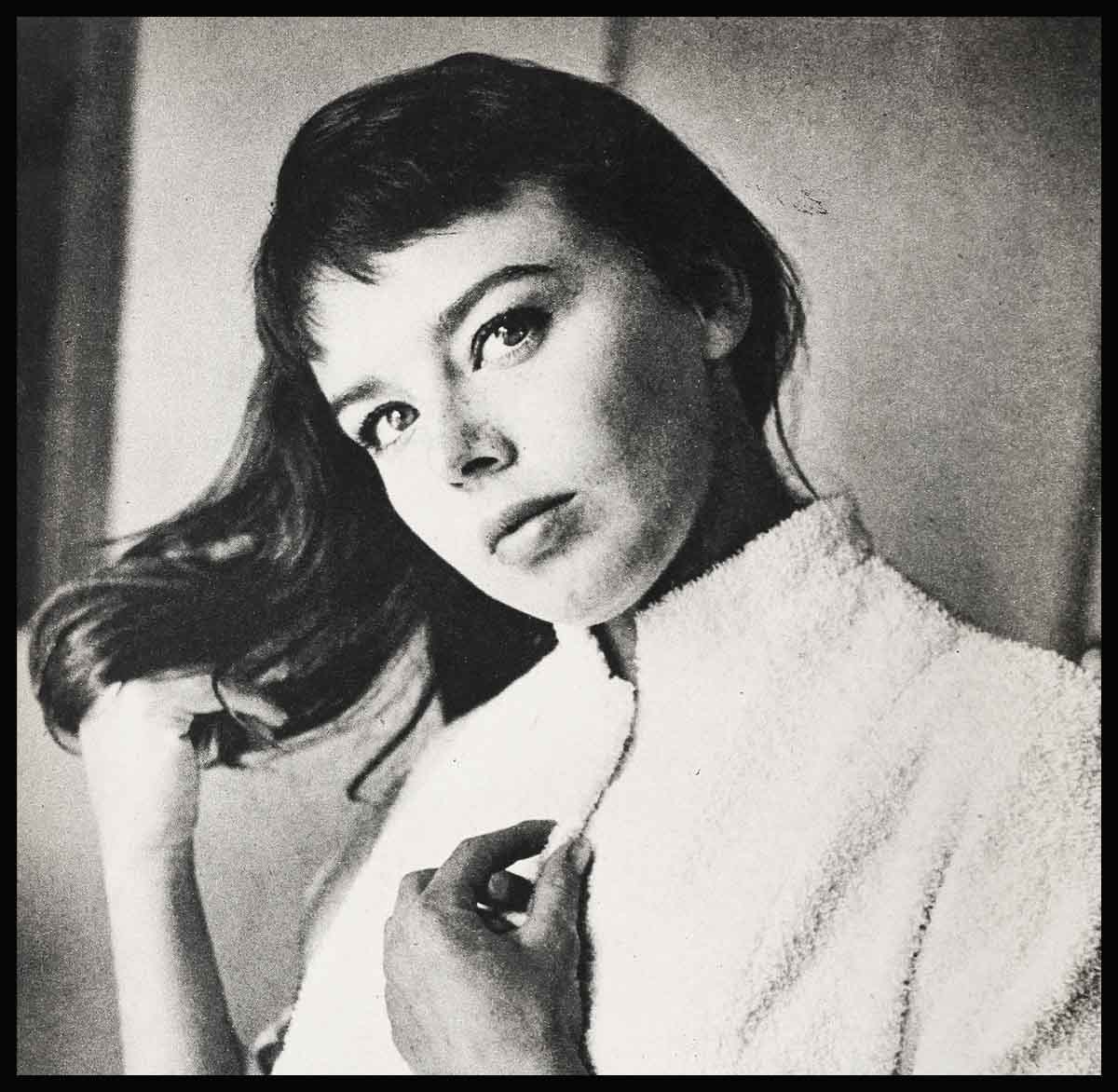
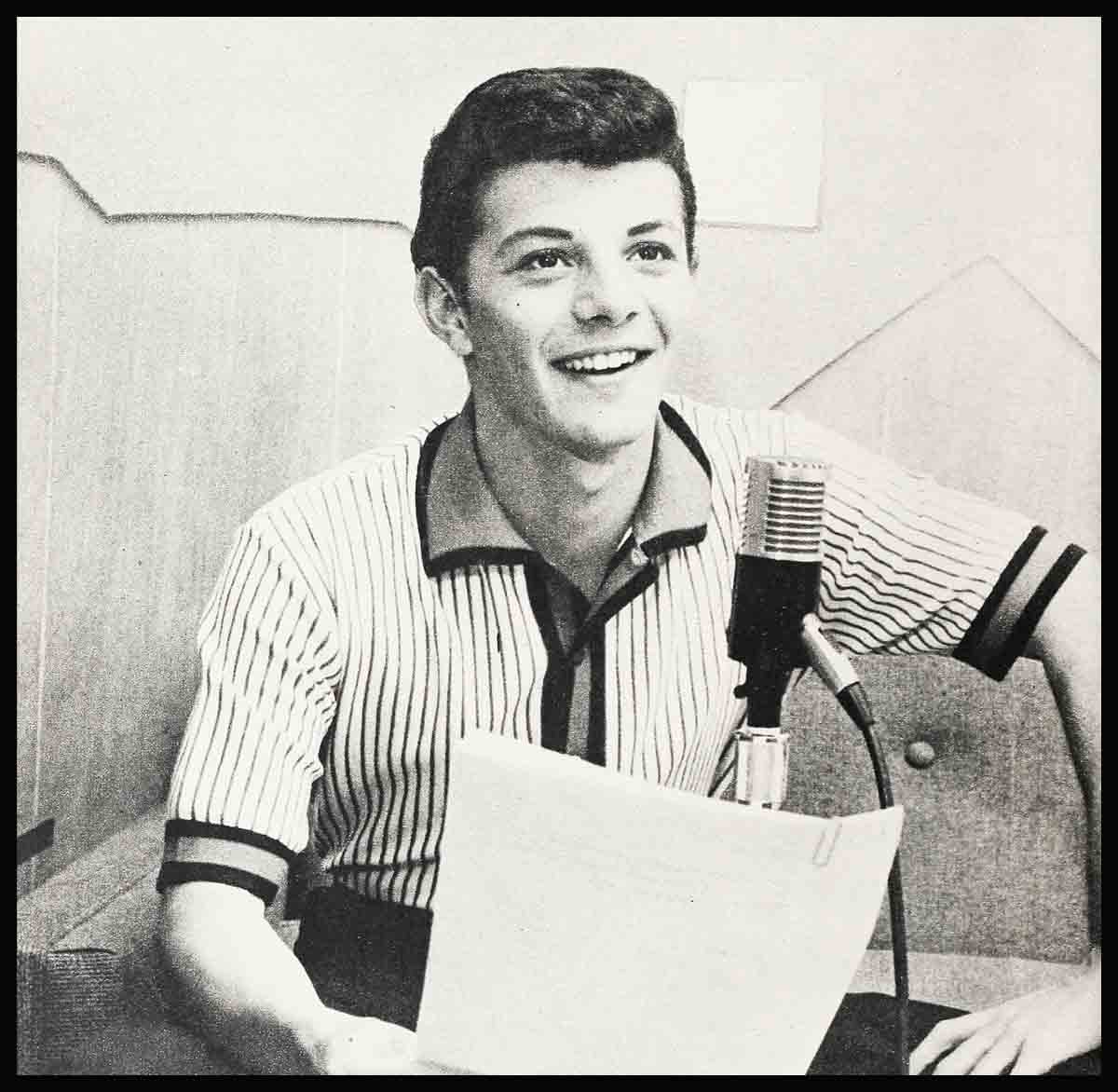
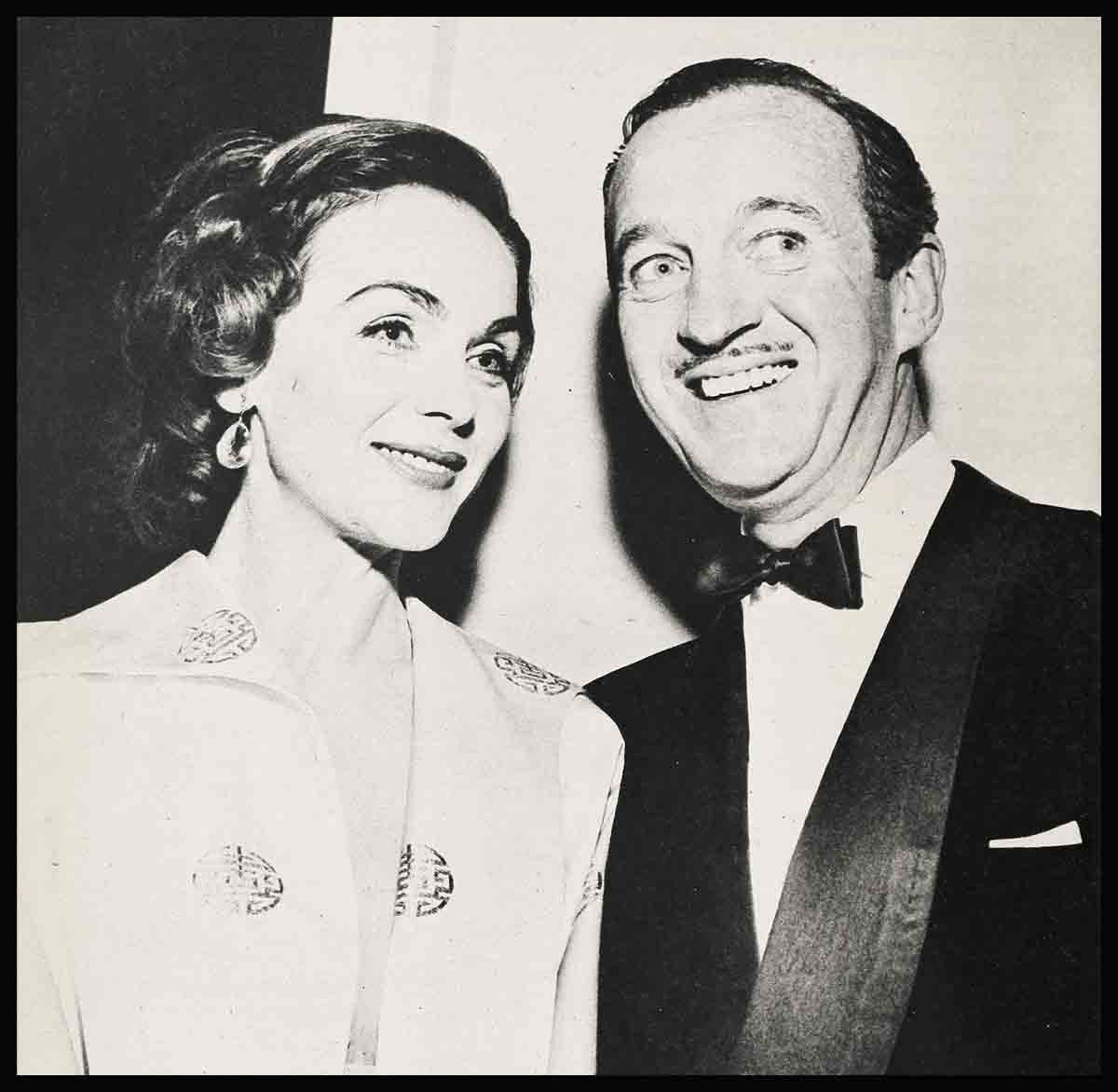
No Comments